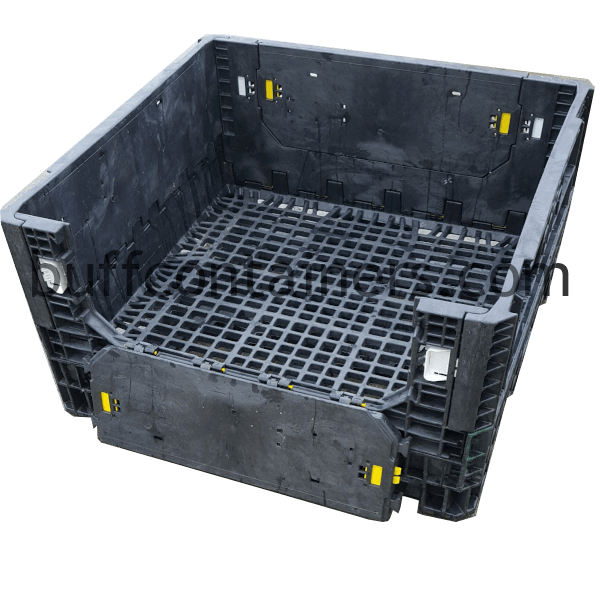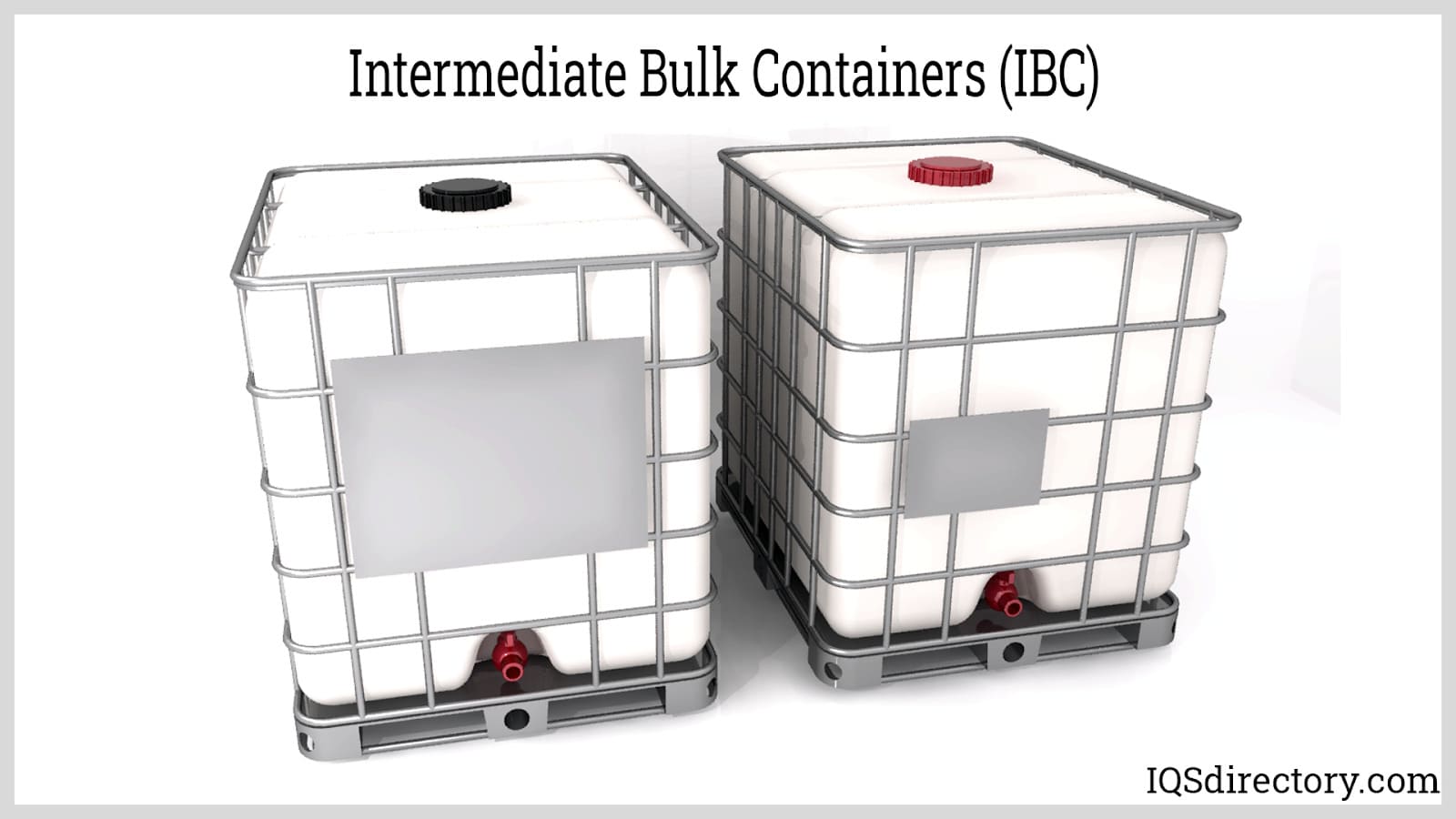Discover how durable Bulk Plastic Containers can improve your storage solutions
Wiki Article
The Role of Bulk Plastic Containers in Effective Recycling Practices and Sustainability
Mass plastic containers are essential to modern recycling initiatives. Their style boosts the performance of material collection and transport, adding to sustainability objectives. These containers not just enhance space but also assist in monitoring contamination levels. However, their execution is not without challenges. Understanding the full scope of their effect exposes an intricate partnership in between logistics and environmental obligation that necessitates more exploration.Understanding Bulk Plastic Containers
Bulk plastic containers act as a crucial element in different markets, facilitating the storage and transport of items. These containers are generally made from durable products such as high-density polyethylene (HDPE) or polypropylene, which give sturdiness and resistance to environmental factors. Their design typically includes attributes like stackability and modularity, allowing for efficient usage of space throughout both storage space and transportation.Industries such as farming, food processing, and manufacturing often make use of mass plastic containers because of their lightweight nature and convenience of handling. The containers can be found in various dimensions and arrangements, catering to the specific requirements of various products. Their adaptability extends past simple capability; they can additionally be tailored with lids, handles, and classifying options to improve use - bulk plastic containers for sale. Consequently, mass plastic containers play a critical role in enhancing logistics and supply chain procedures across multiple sectors, thereby adding to general effectiveness and cost-effectiveness
Advantages of Making Use Of Bulk Plastic Containers in Recycling
When organizations focus on reusing initiatives, the application of bulk plastic containers significantly boosts the efficiency of the process. These containers are designed to optimize space, permitting the storage and transportation of bigger quantities of recyclable products. This causes less journeys to recycling facilities, thus minimizing gas intake and linked exhausts.Furthermore, mass plastic containers are resistant and long lasting to different environmental variables, guaranteeing that materials remain protected throughout handling and transit. Their lightweight layout even more adds to reduce transportation expenses.
The uniformity of these containers facilitates far better sorting and processing of recyclable products, which can improve total recycling prices. Organizations that adopt bulk plastic containers likewise show a dedication to sustainability, favorably affecting their brand picture. Eventually, these benefits not just improve recycling practices yet likewise add to broader environmental objectives
Exactly How Bulk Plastic Containers Facilitate Product Collection
Reliable material collection is considerably boosted by the use mass plastic containers, as they give a organized and efficient remedy for gathering recyclable things. These containers are created to suit large volumes of products, which simplifies the sorting and storage space process. Their stackable layout takes full advantage of space utilization, making it easier for centers to organize recyclables without clutter.Additionally, mass plastic containers are weather-resistant and sturdy, enabling outdoor positioning without degradation. This resilience guarantees that products remain protected until they are gathered for handling.

The uniformity in size and shape of these containers helps with standardization throughout collection points, enabling far better tracking of recyclable volumes. In addition, their transparent nature permits for easy visibility of contents, helping in the monitoring of contamination levels and guaranteeing that only appropriate materials are gathered. Generally, bulk plastic containers play an important function in improving the material collection process, therefore promoting effective reusing practices.
Transportation Efficiency and Environmental Impact
Transport performance plays a crucial function in the reusing process, specifically via the optimization of lots capacity in mass plastic containers. By maximizing the quantity of material carried, companies can greatly reduce the variety of trips required, consequently reducing their carbon footprint. This technique not only improves functional effectiveness but additionally adds to more sustainable ecological methods.
Enhancing Tons Ability
Although enhancing load capacity is frequently neglected, it plays a crucial function in enhancing transport effectiveness and lessening environmental effect in reusing practices. By making best use of the volume that mass plastic containers can hold, reusing procedures can decrease the variety of journeys needed for transport. This not only decreases gas usage yet also lowers the deterioration on lorries. Efficient load administration enables centers to make use of space successfully, ensuring that each transport cycle is as efficient as feasible. In addition, well-optimized lots can lead to better settlements with logistics carriers, potentially lowering total prices. Ultimately, boosting tons ability adds to a more sustainable recycling system by fostering efficient resource use and reducing waste generated during transportation.Decreasing Carbon Footprint
As recycling procedures undertaking to decrease their ecological effect, minimizing the carbon impact related to transportation emerges as a vital goal. Bulk plastic containers play an essential role in achieving this aim by boosting lots effectiveness and enhancing logistics. Their lightweight yet long lasting style permits maximum freight area usage, decreasing the number of trips needed to carry materials. By consolidating shipments, reusing centers can lower fuel consumption and greenhouse gas emissions. Furthermore, purposefully situating recycling facilities reduces transportation distances, additionally reducing carbon outputs. Utilizing fuel-efficient automobiles and alternate power sources enhances general sustainability. By integrating these techniques, the reusing market can appreciably reduce its carbon footprint, adding to a more lasting future.Challenges in using Bulk Plastic Containers

Contamination Issues
Contamination issues represent a considerable obstacle in the reliable use mass plastic containers within recycling techniques. These containers often accumulate residues from previous contents, causing combined products that can prevent the reusing procedure. Pollutants such as food waste, chemicals, or non-recyclable products can compromise the honesty of the whole set, leading to raised disposal costs and decreased reusing prices. Additionally, improper cleansing or sorting can aggravate these concerns, making it tough for recycling facilities to refine materials successfully. The presence of pollutants not just affects the top quality of recycled items yet also weakens the total sustainability initiatives targeted at reducing plastic waste. Resolving these contamination challenges is crucial for boosting the efficiency of mass plastic container recycling.Recycling Infrastructure Limitations
Inefficiency in reusing infrastructure poses substantial difficulties for the efficient management of mass plastic containers. Lots of recycling centers lack the capacity to refine big volumes of these containers successfully, leading to increased delays and prices. Additionally, insufficient arranging innovations typically lead to contamination, as mass containers may be blended with other materials, making complex the recycling procedure. Limited transport options additionally hinder the activity of bulk plastic containers to proper recycling facilities, leading to boosted landfill waste. Furthermore, an absence of standardized procedures for mass container recycling produces complication among customers and businesses, further making complex initiatives to promote sustainability. Resolving these facilities limitations is necessary to boost reusing techniques and make best use of the capacity of mass plastic containers in a round economy.Finest Practices for Implementing Bulk Plastic Containers
They should prioritize a tactical method that improves effectiveness and lowers contamination threats when companies take into consideration implementing mass plastic containers in their reusing techniques. Choosing the proper container size and type is important to accommodate the volume of products being refined. Organizations must likewise establish clear labeling and signage to guide customers on correct disposal approaches, minimizing complication and mistakes. Routine training sessions for team can better strengthen these methods, guaranteeing everybody understands their roles in keeping reusing stability.
Furthermore, organizations should apply a regular maintenance schedule to inspect and clean containers, preventing the build-up of impurities. Partnering with regional reusing centers can also streamline the collection procedure, guaranteeing that products are properly processed. Companies ought to check and examine their reusing metrics, using this data to improve techniques over time and advertise continuous enhancement in their sustainability initiatives.
The Future of Bulk Plastic Containers in Lasting Practices
As organizations significantly focus on sustainability, the duty of bulk plastic containers in reusing practices is established to evolve significantly. Innovations in products scientific research are resulting in the growth of biodegradable and recyclable choices, enhancing the ecological advantages of mass plastic containers. Additionally, the application of closed-loop systems will certainly enable much easier collection and repurposing of these containers, reducing waste and resource intake.Technical developments, such as wise monitoring systems, will make it possible for companies to keep track of the lifecycle of mass containers, boosting efficiency in recycling processes. As consumer demand for lasting techniques expands, businesses will likely adopt bulk plastic containers created for reuse and lasting worth. In addition, collaboration between industries and governments will promote the establishment of standardized reusing protocols, guaranteeing that bulk containers are efficiently integrated into wider sustainability efforts. On the whole, the future of mass plastic containers appears appealing, with significant capacity for adding to a round economic climate.
Often Asked Questions
How Are Bulk Plastic Containers Made and What Products Are Utilized?
Bulk plastic containers are typically made from high-density polyethylene (HDPE) or polypropylene (PP) These products are refined through shot molding or strike molding methods, resulting in sturdy, light-weight containers suitable for numerous storage space and transportation demands.
Can Bulk Plastic Containers Be Recycled Several Times Before Recycling?
Yes, bulk plastic containers can be recycled multiple times prior to recycling. Their toughness and design permit for repeated usage in different applications, promoting sustainability and source efficiency while lowering the requirement for brand-new containers.
What Accreditations Exist for Bulk Plastic Containers in Recycling?
Different certifications for mass plastic containers consist of the Recycling Partnership's qualification, the Cradle to Cradle Certified ™ requirement, and the Lasting Packaging Union's guidelines, making sure containers fulfill particular environmental and recyclability requirements for effective recycling.Just How Do Bulk Plastic Containers Compare to Other Recycling Storage Options?
Bulk plastic containers provide better resilience and ability contrasted to other reusing storage alternatives, reducing the risk of contamination and promoting efficient transport. Their style sustains far better organization, enhancing general efficiency in reusing procedures.What Is the Lifespan of a Bulk Plastic Container in Recycling Processes?
The life expectancy of a mass plastic container in reusing procedures commonly ranges from 5 to 10 years, depending on usage, material quality, and environmental conditions, enabling for several cycles of use before ultimate disposal or recycling.When companies focus on recycling efforts, the use of bulk plastic containers considerably improves the performance of the procedure. Transport effectiveness plays a necessary duty in the reusing process, particularly through the optimization of load ability in mass plastic containers. The usage of bulk plastic containers in recycling techniques encounters substantial difficulties, especially concerning contamination issues and constraints within reusing facilities. Contamination problems represent a considerable challenge in the reliable usage of bulk plastic containers within recycling techniques. When organizations take into consideration executing bulk plastic containers in their reusing methods, they ought to prioritize a strategic strategy that improves efficiency and reduces contamination threats.
Report this wiki page